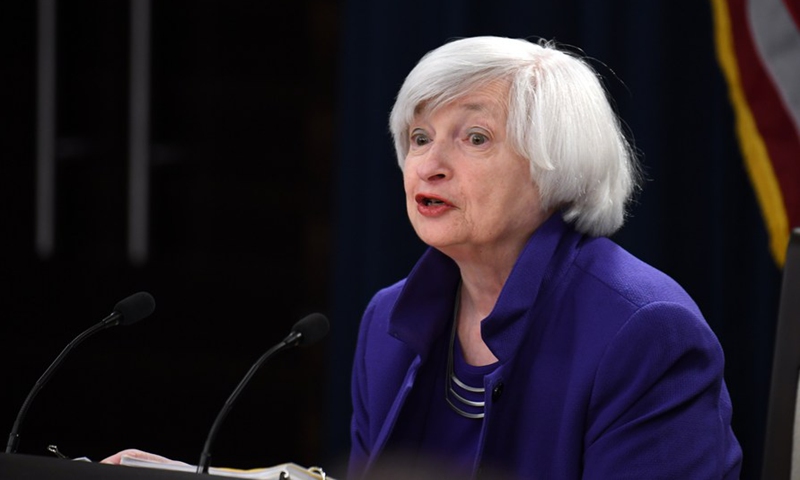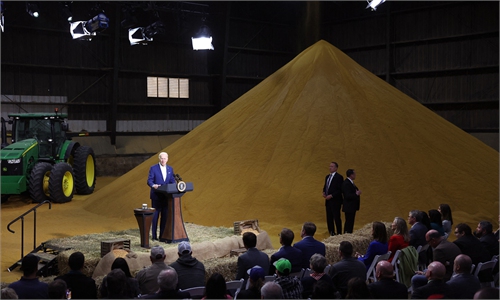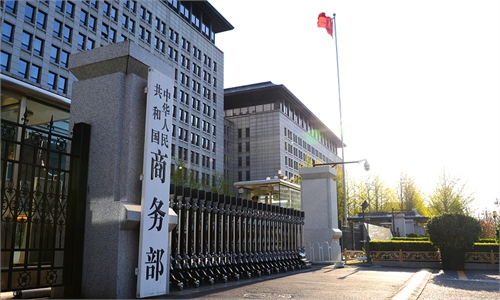Yellen’s threats against China prompt calls for precautions to protect Chinese interests

US Federal Reserve Chair Janet Yellen speaks during a news conference in Washington D.C., the United States, on Dec. 13, 2017. (Xinhua/Yin Bogu)
After US Treasury Secretary Janet Yellen issued threats against China over the Russia-Ukraine conflict, Chinese experts on Thursday cautioned about the rising risk of potential US actions against Chinese businesses and called for precautions, including possible counter-measures, to safeguard China's legitimate rights and interests.Also on Thursday, a spokesperson for the Chinese Ministry of Commerce (MOFCOM) vowed to take "necessary measures" to protect Chinese businesses' rights and interests, after reports of certain foreign companies forcing Chinese firms to take sides over the Russia-Ukraine conflict. The spokesperson stated that sanctions against Russia have caused disruptions to normal China-Russia trade activities.
The latest official remarks from both sides showed that diplomatic tension between China and US over the Ukraine situation may extend to the economic field, as Washington is running out of options against Russian and becomes increasingly unhinged in trying to force other countries to follow its sanctions against Russia, analysts noted.
During a speech on Wednesday US time, Yellen warned that China would lose its standing in the world if it does not help end the Russia-Ukraine conflict and threatened that countries seeking to undermine Western sanctions against Russia could face economic consequences, according to a Reuters report.
"The world's attitude toward China and its willingness to embrace further economic integration may well be affected by China's reaction to our call for resolute action on Russia," Yellen said at the Atlantic Council think tank in Washington.
Yellen also said that it would be increasingly difficult for China and the West to separate economic issues from broader national security concerns. Some foreign media outlets described the remarks as a pointed warning to China.
While criticizing Yellen's "unreasonable accusations" against China, Gao Lingyun, an expert at the Chinese Academy of Social Sciences in Beijing, said that the US Treasury Secretary's remarks signaled the rising risk of the US government possibly taking actions against Chinese businesses.
In fact, Chinese companies and broader China-Russia activities have already seen disruptions caused by Western sanctions against Russia, according to Shu Jueting, the MOFCOM spokesperson.
"Since the beginning of the Russia-Ukraine conflict, sanctions imposed by relevant countries on Russia have caused disruptions to normal trade between China and Russia," Shu told a press conference, while commenting on reports of certain foreign companies trying to force Chinese firms to take sides over the conflict.
Shu said that China will take "necessary measures" to resolutely safeguard the lawful interests of Chinese companies, adding that China's foreign trade laws and other regulations dictate that Chinese companies should not make improper public statements under external pressure, in order to maintain a fair and free foreign trade environment.
Given the rising risk of the US taking actions against Chinese interests, underscored by Yellen's threats, China should prepare a set of reciprocal measures, under the new Anti-foreign Sanctions Law, to counter possible US sanctions and protect Chinese businesses, analysts said.
For instance, the US may again weaponize its global financial dominance to target Chinese companies, including seeking to exclude Chinese firms from global financial transaction systems, Gao told the Global Times on Thursday.
The US has already blocked Russia from its foreign currency reserves and banned several Russian banks from the SWIFT messaging network, which underpins international interbank financial transactions.
"Washington may also possibly resort to old tricks such as those it has used against Huawei - cutting firms from key supply chains and banning them from critical technology," Cui Hongjian, director of the Department of European Studies at the China Institute of International Studies, told the Global Times on Thursday, noting that "there will be certain negative impacts."
Cui called for efforts to prepare a set of counter-measures and reciprocal sanctions and take precautions in advance to protect the legitimate rights and interests of Chinese businesses.
At the press conference on Thursday, Shu reiterated that China always opposes unilateral sanctions and long-arm jurisdiction without the backing of international law and the authorization of the UN Security Council, and opposes unlawful actions prohibiting or restricting Chinese companies from engaging in normal business activities with their partners from other countries.



